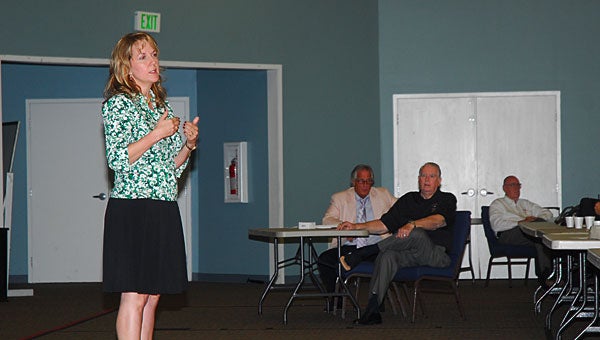Churches not immune from crime, speakers say
Published 9:17 pm Thursday, September 19, 2013

Dodgen Security Consulting owner Carol Dodgen, left, speaks to local church leaders during a Sept. 19 seminar at the First Baptist Pelham Annex building. (Reporter Photo/Neal Wagner)
By NEAL WAGNER / City Editor
Churches are not safe from the plethora of crimes plaguing society, and in some cases are more likely to be victimized than other organizations, a trio of security officials told local church leaders during a Sept. 19 seminar in Pelham.
The event, which was sponsored by the Shelby County Sheriff’s Office, the Shelby County Law Enforcement Chaplain’s Association and the Shelby Baptist Association and hosted at the First Baptist Pelham Annex building, focused on helping area churches deal with everything from active shooter situations to fraud.
Dozens have been wounded or killed in several active shooter situations over the past few decades, Dodgen Security Consulting owner Carol Dodgen told the about 100 in attendance.
“The chances of being involved in an active shooter situation is about the same as being struck by lightning,” Dodgen said, noting, though the situations are rare, it’s important to be prepared just in case.
Dodgen encouraged attendees to take notice of a person’s sudden change in personality, history of violence or paranoia, as these can be indicators of a future violent act.
In churches, most violent acts result from robberies, followed by domestic violence spillovers and personal conflicts. If an active shooting does occur, Dodgen said it’s important to report details such as the shooter’s clothing, type of weapon and appearance to law enforcement immediately.
Having an advance plan to deal with an active shooter is the best way to ensure a congregation’s safety, Dodgen said.
Retired Bureau of Alcohol, Tobacco and Firearms agent Jerry Turpen encouraged the church leaders to form safety committees to examine the security of their church campuses. Turpen said keeping landscaping unobtrusive and ensuring proper lighting can help make a church more secure.
Retired Federal Bureau of Investigation agent Alton Sizemore said churches often are at a higher risk of fraud than other organizations because church congregations tend to be more trusting than other groups.
Sizemore encouraged church leaders to have at least two people present whenever money is handled or counted, and said segregation of money-related responsibilities can help prevent theft.









